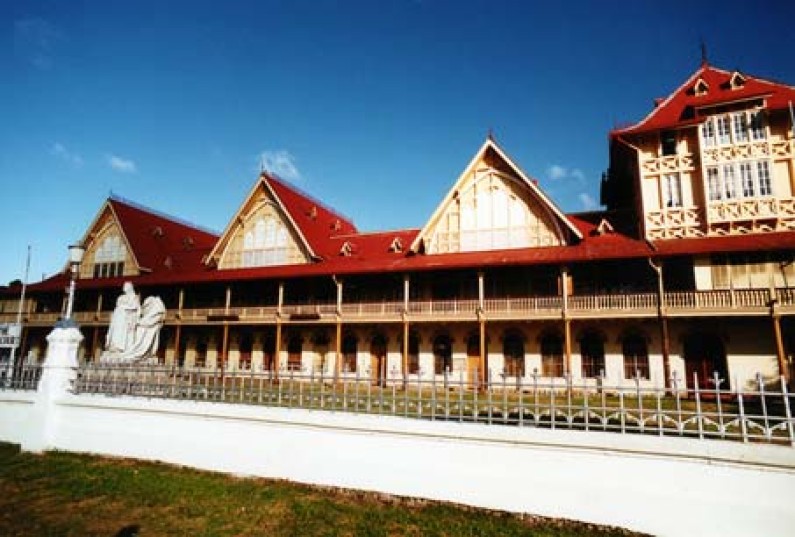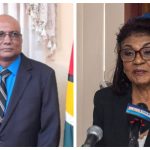
Acting Chief Justice, Roxane George, this afternoon dismissed an application filed by A Partnership for National Unity’s (APNU) Chief Scrutineer, Carol Smith-Joseph challenging the List of Voters for Local Government Elections, declaring that the application lacked evidence, and was riddled with unsubstantiated claims.
“It does appear that relying on unsubstantiated and inadmissible evidence, the applicant is inviting this court by a side-wind to impugn the OLE [Official List of Electors] that was utilized for the 2020 National and Regional Elections. The invitation is unequivocally rejected,” the Chief Justice said as she handed down the ruling today in the High Court.
In her application, which was filed late last year, and ultimately resulted in the postponement of the March 13 Local Government Elections, Smith-Joseph argued that the Guyana Elections Commission (GECOM) did not abide by the electoral laws in its preparation of the List of Voters for the local election.
In particular, she claimed that the utilization of Section 5 (6) of the Electoral Laws (Amendment) Act was unreasonable on the ground that Elections Commission should have applied Section 11 of the Local Authorities Elections Act instead, as was done by the for the 2016 and 2018 Local Government Elections.
Through her Attorney, Senior Counsel Roysdale Forde, Smith-Joseph told the Court that GECOM did not have the discretion to act as it did but Chief Justice disagreed, noting that there was no reason for the Court to intervene in the world of the Commission which is guided by Article 162 of the Constitution.
From the onset, the Chief Justice said many of the reliefs sought by the applicant were repetitive, and could not be granted due to lack of evidence.
The APNU Chief Scrutineer wanted the Court to declare that the Register of Voters was not reasonably accurate or credible, and was therefore, unconstitutional and unlawful. But the Chief Justice said there was no evidence to support the claim.
Noting that the primary qualification to vote in Local Government Elections is tied to the process of registration of Electors for the National elections, the Chief Justice said Section 5 (6) has to be read in that context.
“The fact that Section 5 (5) provides that the OLE is prepared to choose a President and Members of a National Assembly and Regional Democratic Councils does not preclude the use of the Official List of Elections as the base list for Local Elections,” she reasoned.
The Chief Justice also said that there is nothing in the evidence to support the claim that the OLE is heavily flawed. She said, instead, the applicant has provided unsubstantiated claims.
“There is unsubstantiated information provided for one constituency of a Local Authority Area, and so, this therefore, could hardly lead to a conclusion that the OLE is flawed,” the Chief Justice said.
The Chief Justice noted also while amendments were made to the Electoral Laws (Amendment) Act, Parliament did not repeal Section 5 (6) and therefore provided GECOM with the discretion to proceed under Section 11 (1) of Chapter 28:03 or Section 5 (6) depending on the circumstances.
Further, she ruled that the move by the Elections Commission to update the Electoral System to cater for constituencies in Local Authority Areas does not mean that the Official List of Electors cannot be used as a source for the preparation of a register of voters for the Local Authority Areas and the constituencies therein.
The Chief Justice said there was no evidence to support the setting aside of the extracted list of electors.
“There is nothing in the evidence to show that the ROVs [Register of Voters] in the then scheduled March 13, 2023 Local Government Elections were not credible in anyway. Litigants must appreciate that courts rely on evidence, not unsubstantiated opinions,” she said.
With the March 13 Elections long postponed and June 12 set as the new date for the Local Government Elections, the Chief Justice said the case, is now merely an academic case.
However, she urged the Parliament to harmonize the electoral laws.
“The only positive thing that came from this case is that it allows the Court to urge that Parliament must endeavour to harmonize the elections laws, and to resist piecemeal amendments that range over many pieces of legislation,” the Chief Justice said.

















You must be logged in to post a comment Login